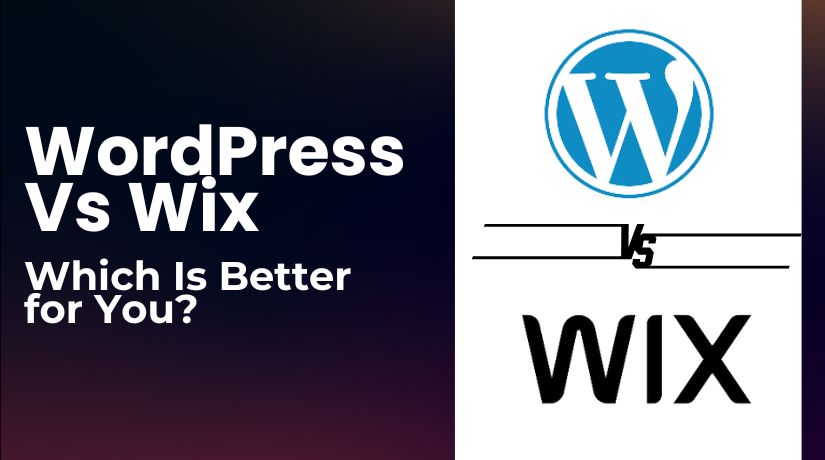
Table of Contents
- Understanding WordPress and Wix
- WordPress Vs Wix: Pros, Cons, and the Best Option for You
- Ease of Use: Which Is Better for Novices?
- Design and Customization: Templates and Themes
- Which One Offers Better Value?
- Plugins and Extensions: Expanding Functionality
- Blogging Capabilities: Which Is Better for Content Creation?
- eCommerce Features: Building an Online Store
- SEO Features: Which Platform Ranks Higher on Search Engines?
- ustomer Support: Getting Help When Needed
- Data Portability: Moving Content Easily
- Conclusion: Wix or WordPress – Which Should You Choose?
Wix and WordPress are two well-liked choices for website development. Depending on your requirements, each platform provides different advantages. The choice between “WordPress vs. Wix” might impact your website’s performance. Both systems have characteristics that certain users find appealing. Wix provides simplicity, but WordPress is renowned for its versatility. This article compares and contrasts “Wix or WordPress” in terms of customisation, design, and usability. Let’s look at the differences to help you make decision.
Understanding WordPress and Wix
Choosing between “Wix versus WordPress” requires understanding each platform’s core offerings. Both WordPress and Wix have different approaches to website building.
WordPress
WordPress is one example of an open-source content management system (CMS). It is designed for those who want total control over personalisation. WordPress may be used to create any type of website, including blogs and online stores. It is popular because it provides state-of-the-art features without limitations. Despite being free, WordPress requires separate hosting. Hosting gives your website a home on the internet. WordPress is highly adaptable because to its thousands of themes and plugins. If you want a unique website with plenty of features, WordPress can be your best choice.
Wix
Wix is an all-in-one solution for hosted website builders. It is renowned for having an easy-to-use drag-and-drop editor. Anyone may easily create a website without knowing any code thanks to this. You don’t need a separate hosting package because Wix includes hosting. You may use Wix to make a modest online store, portfolio, or blog. Its emphasis on usability makes it appealing to beginners. You may also speed up your design process by using templates. Wix is ideal for customers that want to create a website fast and simply.
WordPress Vs Wix: Pros, Cons, and the Best Option for You
Ease of Use: Which Is Better for Novices?
It is crucial to consider ease of use while deciding between “WordPress vs. Wix.” Every platform provides features that make creating websites easier.
Wix: Wix’s user-friendly drag-and-drop editor is well-known. Users may precisely position components using the editor. The Artificial Design Intelligence (ADI) in Wix generates designs according to your specifications. This feature is ideal for people who are new to design. Using Wix, you can quickly create a website without knowing any coding. It’s easy to see your changes immediately because everything is visible.
WordPress: Additionally, WordPress has a versatile editor called the block editor. Despite its potency, it takes little time to learn. Once they grasp the fundamentals, WordPress is straightforward for many novices. You may use plugins like Elementor for more easier editing. This plugin transforms WordPress into a Wix-like drag-and-drop interface. WordPress is a little less user-friendly, but it gives you more power.
Verdict: Wix is the easiest for beginners. WordPress requires learning but offers more control.
Design and Customization: Templates and Themes
“WordPress vs Wix” offers distinct options for design and customization. Each has features that can meet different design goals.
Wix: Wix provides over 800 pre-designed templates for various industries. You can choose templates for business, personal, or eCommerce sites. But once a template is selected, it can’t be altered. If you decide you want a different appearance later, this may limit your options. Customising Wix templates is simple, but you can only use the built-in tools.
WordPress: There are many of free and premium themes available on WordPress. Themes may be changed at any time without requiring a website rebuild. You are able to build a unique design since WordPress themes are so adaptable. You may utilise plugins to give your theme more advanced features. You may also change the code if you want to do further customising with WordPress. WordPress is therefore ideal for people that need a certain style.
Verdict: WordPress provides more customization and flexibility. Wix is simpler but limited.
Pricing: Which One Offers Better Value?
Pricing can be a key factor when deciding “Wix or WordPress.” Each platform has different costs based on its features.
Wix: Wix offers a free plan but includes Wix-branded ads. To remove adverts, users must upgrade to a premium plan. Wix provides both simple and complex solutions based on a website’s needs. Business planning is necessary for eCommerce services like online payments. Premium memberships may provide additional storage and access to the App Market. For many customers, the cost of Wix rises when more capabilities are added.
WordPress: WordPress is free to use but requires separate hosting. Hosting plans vary in cost, starting as low as $3 per month. Bluehost and SiteGround are popular hosts for WordPress users.WordPress also provides both free and premium plugins and themes. By letting consumers select additional services as needed, costs are kept under control. WordPress could end up being a more economical option in the long run.
Verdict: WordPress offers better value for users with specific customization needs. Wix is more straightforward but can cost more with premium plans.
Plugins and Extensions: Expanding Functionality
Plugins or extensions can greatly expand a website’s functionality. Let’s see how “Wix versus WordPress” compares in this area.
Wix: Wix offers around 200 apps in its App Market. These apps cover essential functions like forms, social media, and galleries. While some applications need a monthly fee, others are free. Nevertheless, third-party support in Wix’s App Market is somewhat restricted. While most applications function well, they don’t have the same versatility as plugins.
WordPress: WordPress has over 59,000 plugins, covering almost any feature. Popular plugins include SEO tools, eCommerce, and custom forms. Many plugins are free, but premium options add more advanced features. Third-party tools and WordPress plugins work nicely together. WordPress is ideal for websites that need special features because of its versatility.
Verdict: WordPress is better for feature-rich sites with specific requirements. Wix has essential apps but fewer options.
Blogging Capabilities: Which Is Better for Content Creation?
Blogging is a popular feature for both platforms. Let’s see how “Wix or WordPress” performs in blogging.
Wix: Wix includes basic blogging features in its platform. It provides essential tools like tagging, categories, and media integration. However, commenting on Wix blogs requires third-party systems like Facebook or Disqus. The blogging editor is simple but lacks advanced formatting options. Wix is best for beginners needing a basic blog setup.
WordPress: WordPress was designed for blogging, making it highly efficient. It has robust tagging, categorization, and native commenting tools. WordPress’s Gutenberg editor allows for custom blog layouts. Plugins like Yoast SEO can enhance blog content visibility. Advanced bloggers often prefer WordPress due to these capabilities.
Verdict: WordPress is superior for bloggers wanting advanced content control. Wix is suitable for basic blogging needs.
eCommerce Features: Building an Online Store
For online businesses, eCommerce features are essential. Here’s how “WordPress vs Wix” compares in eCommerce capabilities.
Wix: Wix offers eCommerce features in its business plans. Users can create an online store with basic shopping cart features. Inventory management and safe payments are part of Wix’s business concept. The capability is more limited than with dedicated eCommerce systems. Wix’s eCommerce is easy to use, but large retailers shouldn’t utilise it.
WordPress: WordPress uses the WooCommerce plugin for full eCommerce functionality. WooCommerce builder is free and highly customizable, ideal for various products. It integrates with multiple payment gateways without additional fees. WooCommerce supports inventory management, subscriptions, and product variations. WordPress is often preferred by growing businesses with advanced needs.
Verdict: WordPress, with WooCommerce, is more flexible for scalable online stores. Wix suits smaller businesses with basic selling needs.
SEO Features: Which Platform Ranks Higher on Search Engines?
SEO is crucial for increasing website visibility. Let’s see how “Wix versus WordPress” performs in SEO capabilities.
Wix: Wix has built-in SEO tools to support basic optimization. It includes tools for meta tags, sitemaps, and mobile optimization. Wix also has an SEO Wiz for beginners needing quick SEO guidance. However, advanced SEO adjustments are limited within Wix’s platform. This makes Wix best for simple, small-scale SEO needs.
WordPress: With the help of plugins like Yoast SEO, WordPress shines at SEO. Yoast gives you total control over URLs, metadata, and keywords. Additionally, WordPress websites may optimise permalinks, pictures, and tags. Users may install plugins or alter code to further personalise SEO. Those that desire robust, adaptable SEO solutions like WordPress.
Verdict: WordPress is more powerful for users focusing on advanced SEO. Wix offers only basic SEO tools for beginners.
Customer Support: Getting Help When Needed
On every platform, dependable assistance is crucial. This is the way that “Wix or WordPress” offers customer service.
Wix: Wix offers 24/7 support for users on premium plans. Support options include phone support, live chat, and help articles. Wix’s Help Center provides guides on using key features. This support system makes Wix easy to navigate for beginners. Users can also access dedicated troubleshooting and tutorials.
WordPress: WordPress relies on a community-driven support system. Users can find answers through forums, documentation, and online tutorials.A lot of hosting companies additionally give assistance for problems unique to WordPress. Users may require paid plugins or third-party support for more complex assistance. Although it lacks centralised support, WordPress offers a wealth of information.
Verdict: Wix provides direct support, ideal for beginners. WordPress relies on community and hosting support.
Data Portability: Moving Content Easily
Data portability allows users to move content between platforms. Here’s how “WordPress vs Wix” compares on this aspect.
Wix: Wix offers few options for content export. Only blog entries, not the full content of a website, can be exported by users. Transferring data to other platforms is challenging because of this restriction. The structure of Wix is more restricted for users who wish to switch. When moving to a new platform, users could run into difficulties.
WordPress: WordPress offers full data portability with easy export options. Users can download posts, pages, and media files in XML format. This flexibility makes it simple to migrate WordPress sites if needed. WordPress also allows users to back up entire websites. For long-term flexibility, WordPress provides ideal portability.
Verdict: WordPress is better for users needing full control over data. Wix is more restrictive, with limited export options.
Conclusion: Wix or WordPress – Which Should You Choose?
Both “WordPress vs Wix” offer unique strengths depending on user needs.
For novices looking for a quick, simple, and supported setup, Wix is perfect. It offers necessary features for tiny online enterprises and simple websites. Customisation, SEO, and data control are constrained, though.
For customers that want SEO capabilities, flexibility, and customisation, WordPress is ideal. It is quite flexible and appropriate for sophisticated websites, blogs, and e-commerce. With its huge plugin library and data portability, WordPress also facilitates expansion.
Final Recommendation: Choose Wix for simplicity and WordPress for advanced customization.

